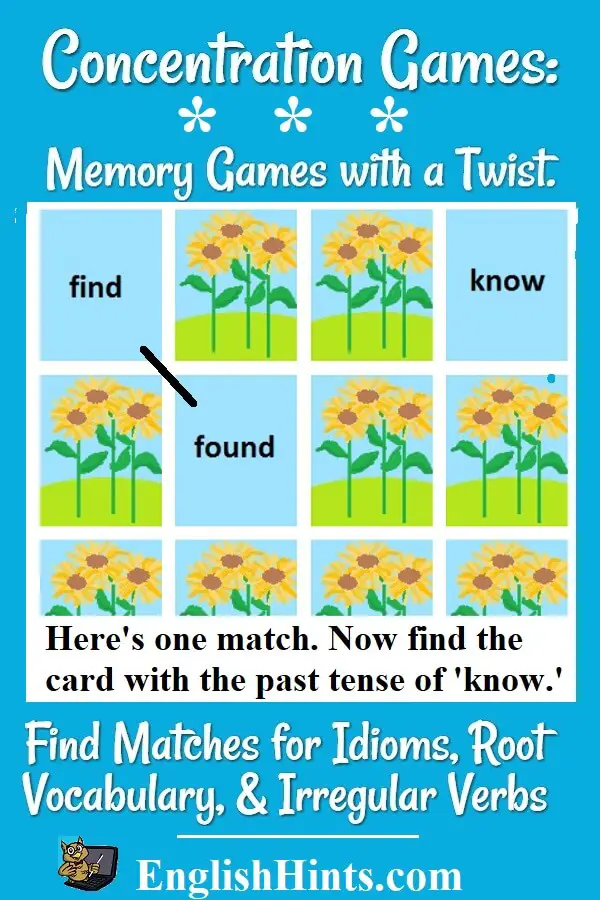Concentration Games: Find the Match
These concentration games will help you review several EnglishHints lessons. You can practice the meanings of some common phrasal verb idioms, words from important Latin roots, and irregular past tense verbs.
They're also called memory games (or Pelmanism in England). You need to remember the locations of cards you have already turned over. Then you'll know where to find them when you turn over the matching card.
How to Play Concentration Games
Concentration is a card game in which a player or players try to match pairs of cards.
All the cards (in this case 12) are laid out, face down, in rows.Players take turns turning over two cards, trying to get a match.
If the cards do not match, they are turned back over and the next player takes a turn.
All players concentrate on remembering the position of each card, so that when they see its match, they can turn both over on their next turn, winning that pair of cards.
The game is over when all cards have been matched. The player with the most matches wins.
You can also play these games alone, trying to match the cards faster than in your previous games. If you’re still not really sure of all the matches, play again and again, until you are completely comfortable with their meanings.
As a bonus, these games are excellent memory and “brain training.”
Which Game Will You Try First?
There are two or three games in each of three sets:
- phrasal verb idioms,
- vocabulary practice with words from three Latin roots, and
- common irregular past tense verbs.
Each game also links to a mobile version. It has 2 rows of six cards rather than 3 rows of four cards. The mobile versions are for phones that cannot fit in all four rows. (If you can fit them all in landscape mode, try that. The regular games are easier to play.)
Games with Phrasal Verb Idioms
Idioms are groups of words that do not mean the same thing as the individual words put together. Some of our most common idioms are phrasal verbs. They're verbs plus prepositions that, together, express a single thought.
For example, you can turn a radio or the air conditioning on, off, up, or down. To turn it on is to start the electricity running. To turn it off is to stop the flow of electricity. To turn up the volume (or the A.C.) is to increase it, and to turn it down is to reduce it.
English is rich in synonyms. (They're words that have very similar meanings.) In conversation we almost always choose the shorter words rather than the longer ones.(The longer words often have French or Latin bases.)
This is true even when we need to add prepositions to the short words. You won’t often hear someone say, “Please increase the volume of the TV. I can’t hear it well.” They’ll shout, “Turn up the TV!”
To review these phrasal verbs before playing, see List of English Phrasal Verbs, A-M or List of Phrasal Verbs, P-W.
For Custom Memory Game 1 using phrasal verbs early in the alphabet, click here.
Click here for Game 2 (phrasal verbs from the 2nd page.)
Memory Games from Latin Roots
EnglishHints has three concentration games for reviewing words from Latin roots. See Memory Game 1 (Acquire a Quest?) to practice words from the Latin verb quaerere. (These words include required, inquisitive, quest, etc. Match the Latin-based word with a synonym: necessary, curious, a search.)
Memory Game 2 practices words from cedere: precede, success, etc. Memory Game 3 practices vertere: convert, reverse, etc.
Irregular Verb Memory Games
There are also three games that match the irregular pasts with the main present tense forms of 17 irregular English verbs.
The verb 'to be' has two matches. ('Am/is' matches 'was.' 'Are' is the match for 'were'.) The other verbs practiced are
- do, get, go, have (all in irregular verb game 1),
- eat, make, say, see, take, tell (game 2), and
- buy, find, give, know, leave, and think (game 3.).
More Concentration Game Ideas
These games can be downloaded as inexpensive printable pdfs if you want to play them offline. (Print on regular paper or cardstock, in color or grayscale.) See Print & Play ESL Classroom Games for the irregular verb games. Root & Suffix Worksheets has pdfs that include the root game cards. Common Phrasal Verbs includes those memory games.
You can also make similar cards yourself, but if you share them, please give credit to EnglishHints. (The card matches and meanings are under copyright. You have my permission to use them as long as you give credit and don't sell them. If you design your own matching meanings, you're free to do whatever you want, of course.)
For more memory work-outs, see Games of Memory for Kids These games are designed for children, but they're good for stretching adult memories too.
They are mostly picture to picture matching. You can use them as vocabulary practice for Beginners. Just say the name of each item when you see the picture. (In coins, you’d say “one dime” or “three pennies,” etc.)
Enjoy the mental work-out you get from these memory and concentration games!
Home> ESL Games> Concentration Games.
Didn't find what you
needed? Explain what you want in the search box below.
(For example, cognates, past tense practice, or 'get along with.') Click to see the related pages on EnglishHints.
| site search by freefind | advanced |






